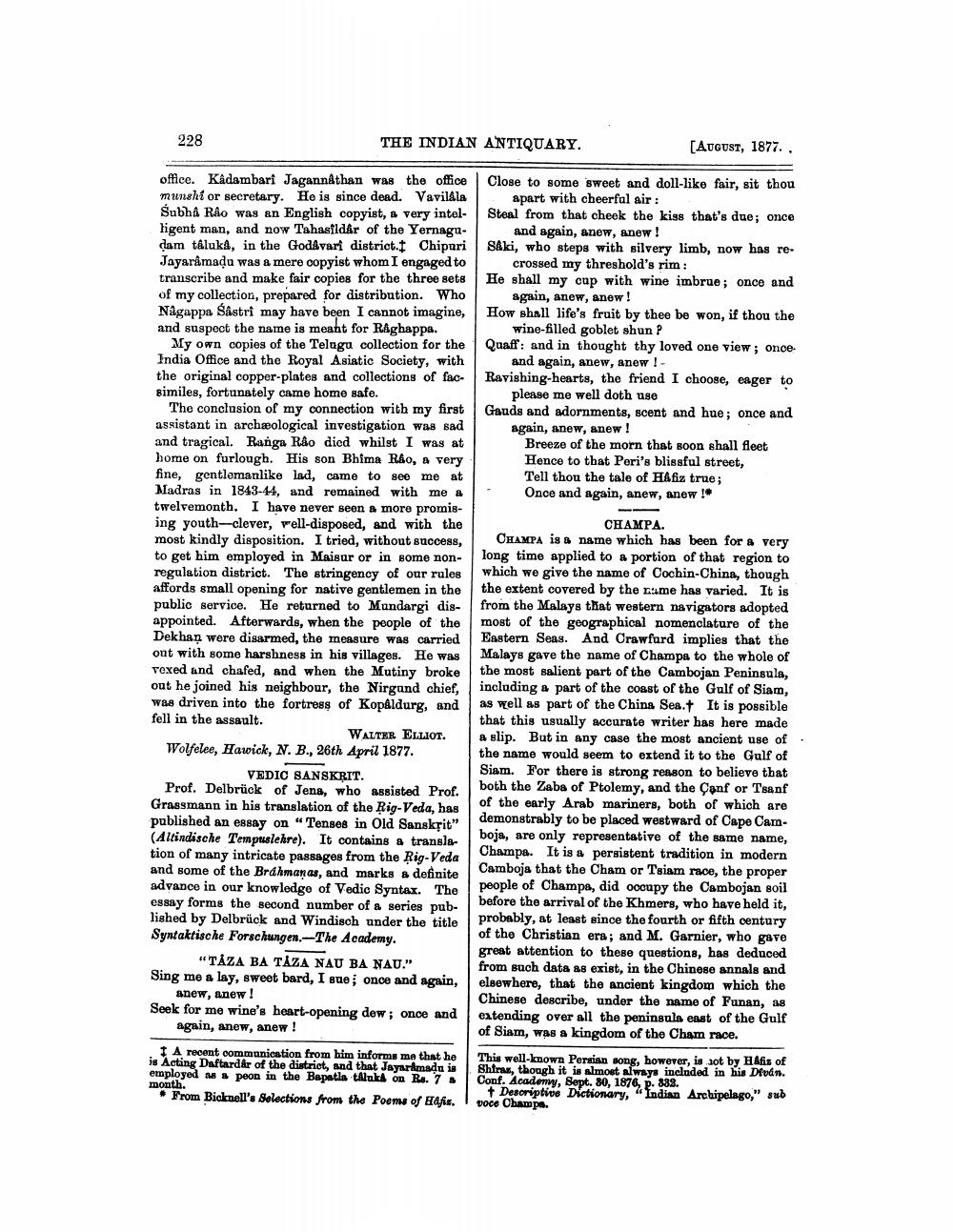________________
228
THE INDIAN ANTIQUARY.
office. Kadambari Jagannathan was the office munshi or secretary. He is since dead. Vavilala Subha Rao was an English copyist, a very intelligent man, and now Tahasildar of the Yernagudam taluka, in the Godavari district. Chipuri Jayaramaḍu was a mere copyist whom I engaged to transcribe and make fair copies for the three sets of my collection, prepared for distribution. Who Nagappa Sâstri may have been I cannot imagine, and suspect the name is meant for Raghappa.
My own copies of the Telugu collection for the India Office and the Royal Asiatic Society, with the original copper-plates and collections of facsimiles, fortunately came home safe.
The conclusion of my connection with my first assistant in archæological investigation was sad and tragical. Ranga Rao died whilst I was at home on furlough. His son Bhima Rao, a very fine, gentlemanlike lad, came to see me at Madras in 1843-44, and remained with me a twelvemonth. I have never seen a more promising youth-clever, well-disposed, and with the most kindly disposition. I tried, without success, to get him employed in Maisur or in some nonregulation district. The stringency of our rules affords small opening for native gentlemen in the public service. He returned to Mundargi disappointed. Afterwards, when the people of the Dekhan were disarmed, the measure was carried out with some harshness in his villages. He was vexed and chafed, and when the Mutiny broke out he joined his neighbour, the Nirgund chief, was driven into the fortress of Kopâldurg, and fell in the assault.
WALTER ELLIOT. Wolfelee, Hawick, N. B., 26th April 1877.
VEDIC SANSKRIT.
Prof. Delbrück of Jena, who assisted Prof. Grassmann in his translation of the Rig-Veda, has published an essay on "Tenses in Old Sanskrit" (Altindische Tempuslehre). It contains a translation of many intricate passages from the Rig-Veda and some of the Brahmanas, and marks a definite advance in our knowledge of Vedic Syntax. The essay forms the second number of a series published by Delbrück and Windisch under the title Syntaktische Forschungen.-The Academy.
"TAZA BA TAZA NAU BA NAU."
Sing me a lay, sweet bard, I sue; once and again, anew, anew!
Seek for me wine's heart-opening dew; once and again, anew, anew!
A recent communication from him informs me that he is Acting Daftardár of the district, and that Jayaramadu is employed as a peon in the Bapatla taluka on Rs. 7 a month.
From Bicknell's Selections from the Poems of Hafiz.
[AUGUST, 1877..
Close to some sweet and doll-like fair, sit thou apart with cheerful air:
Steal from that cheek the kiss that's due; once and again, anew, anew!
Saki, who steps with silvery limb, now has recrossed my threshold's rim:
He shall my cup with wine imbrue; once and again, anew, anew!
How shall life's fruit by thee be won, if thou the wine-filled goblet shun?
Quaff: and in thought thy loved one view; onceand again, anew, anew! - Ravishing-hearts, the friend I choose, eager to please me well doth use
Gauds and adornments, scent and hue; once and again, anew, anew!
Breeze of the morn that soon shall fleet Hence to that Peri's blissful street, Tell thou the tale of Hafiz true; Once and again, anew, anew !
CHAMPA.
CHAMPA is a name which has been for a very long time applied to a portion of that region to which we give the name of Cochin-China, though the extent covered by the name has varied. It is from the Malays that western navigators adopted most of the geographical nomenclature of the Eastern Seas. And Crawfurd implies that the Malays gave the name of Champa to the whole of the most salient part of the Cambojan Peninsula, including a part of the coast of the Gulf of Siam, as well as part of the China Sea. It is possible that this usually accurate writer has here made a slip. But in any case the most ancient use of the name would seem to extend it to the Gulf of Siam. For there is strong reason to believe that both the Zaba of Ptolemy, and the Çanf or Tsanf of the early Arab mariners, both of which are demonstrably to be placed westward of Cape Camboja, are only representative of the same name, Champa. It is a persistent tradition in modern Camboja that the Cham or Tsiam race, the proper people of Champa, did occupy the Cambojan soil before the arrival of the Khmers, who have held it, probably, at least since the fourth or fifth century of the Christian era; and M. Garnier, who gave great attention to these questions, has deduced from such data as exist, in the Chinese annals and elsewhere, that the ancient kingdom which the Chinese describe, under the name of Funan, as extending over all the peninsula east of the Gulf of Siam, was a kingdom of the Cham race.
This well-known Persian song, however, is not by Hafiz of Shiraz, though it is almost always included in his Diván. Conf. Academy, Sept. 80, 1876, p. 332.
+ Descriptive Dictionary, Indian Archipelago," sub
voce Champa.




